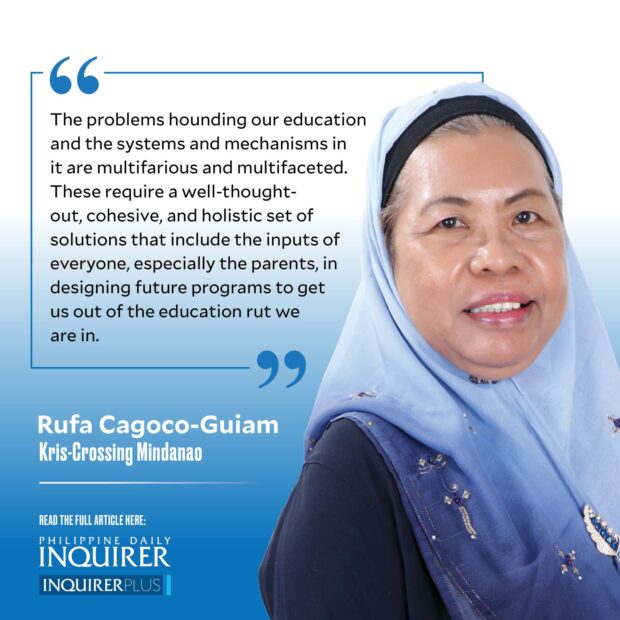Solving Philippine basic education woes
 How has the Department of Education (DepEd) fared so far in addressing the country’s education woes?
How has the Department of Education (DepEd) fared so far in addressing the country’s education woes?
In 2022, Vice President Sara Duterte who is concurrent education secretary asked for an additional P100 billion in confidential funds to “… solve the country’s education woes.” This is on top of the department’s allocation of a staggering P710 billion for this year’s education budget. She said if the DepEd gets it, she will solve the country’s education problems within six years. Both the Senate and the Lower House of Congress approved readily her request, although it was more of a demand.
We are on the second year of the Marcos-Duterte administration. As a taxpaying citizen, I would like to see some initial progress on the programs the Vice President and DepEd secretary has initiated toward solving our country’s perennial education problems.
And it is right that whoever helms the education portfolio in the national government must address the educational problems that have hounded it for many years, even after innumerable educational reforms have been set up and implemented within the administrations of several presidents and their education secretaries.
The problems hounding our education and the systems and mechanisms in it are multifarious and multifaceted. These require a well-thought-out, cohesive, and holistic set of solutions that include the inputs of everyone, especially the parents, in designing future programs to get us out of the education rut we are in.
Every year, we see thousands of professionals—medical doctors, nurses, lawyers, and teachers who pass the government’s licensure or board and bar examinations. Recently, we read of the more than 3,000 new lawyers who successfully passed the 2022 Bar exams. Of course, this was also a very low passing rate since more than 9,000 hopefuls took the bar in November 2022.
The Philippines has also produced thousands of nurses’ board exam passers, as well as certified public accountants. Engineers are also quite numerous, from the different engineering fields, from agricultural engineering to electronics and communications fields.
But perhaps it is in the teaching field that we have produced a multitude of teachers—the passers of the Licensure Examination for Teachers (LET), a requirement when hiring new teachers in both the public and private school systems.
Such huge numbers of professionals in different fields in the country has not translated to a substantial improvement in our overall welfare and development. I surmise that professionals are not using their expertise to contribute collectively toward making our society a better place to live in; their concern for earning a professional title is more of how to use it for personal, pecuniary gains. I do not blame them for this kind of attitude—education in this country is quite expensive. Families have spent tremendous amounts of money to send their children to the best schools that can make them licensed professionals in the future. Of course, the first concern is to get returns on their investments on their children’s education.
Problems on the administration and management side of basic education are innumerable as well. Among many complaints posted on social media is about the corruption involved in the hiring of teachers every year. These posts talk about the “asking price” for hiring new teachers is for the applicant to cough up at least two months of her or his future salary in exchange for getting a tenured position in the basic education sector. There are also persistent complaints about the hiring of people who are not qualified in terms of passing the LET. Their qualification: being relatives of the superintendent or the regional director. One civil society leader has mischievously termed this the practice of the “theory of relativity.”
Some daily wage earners also complain of the monthly contributions required of their school-age children by their homeroom teachers. Being cash strapped most of the time, they find it hard to cough up P100 for monthly contribution for each of their three children (P300 a month).
If Education Secretary Vice President Duterte has started using the confidential funds for solving these anomalous transactions in the DepEd, I would support an additional increase in the DepEd budget for 2024.
Comments to rcguiam@gmail.com




















